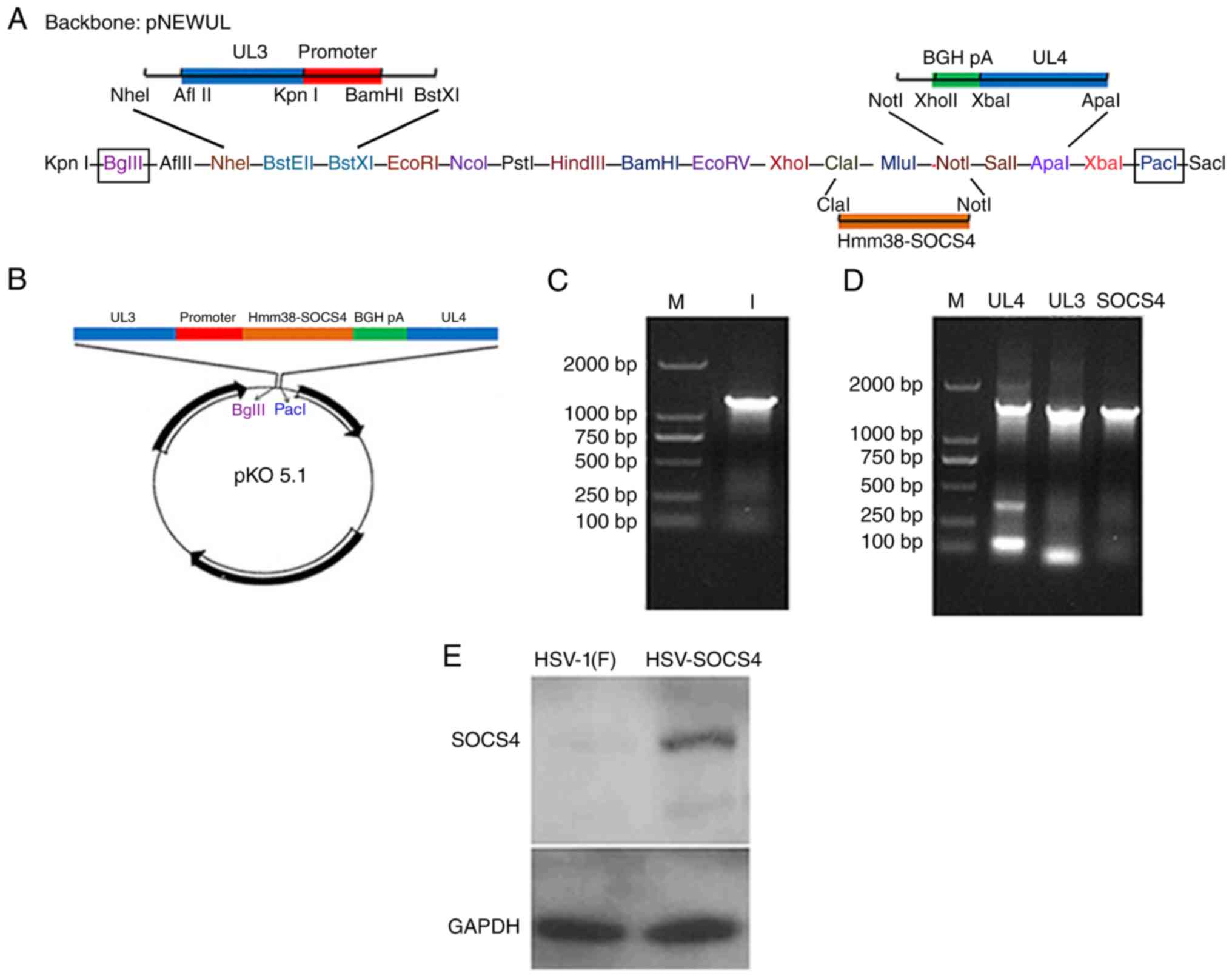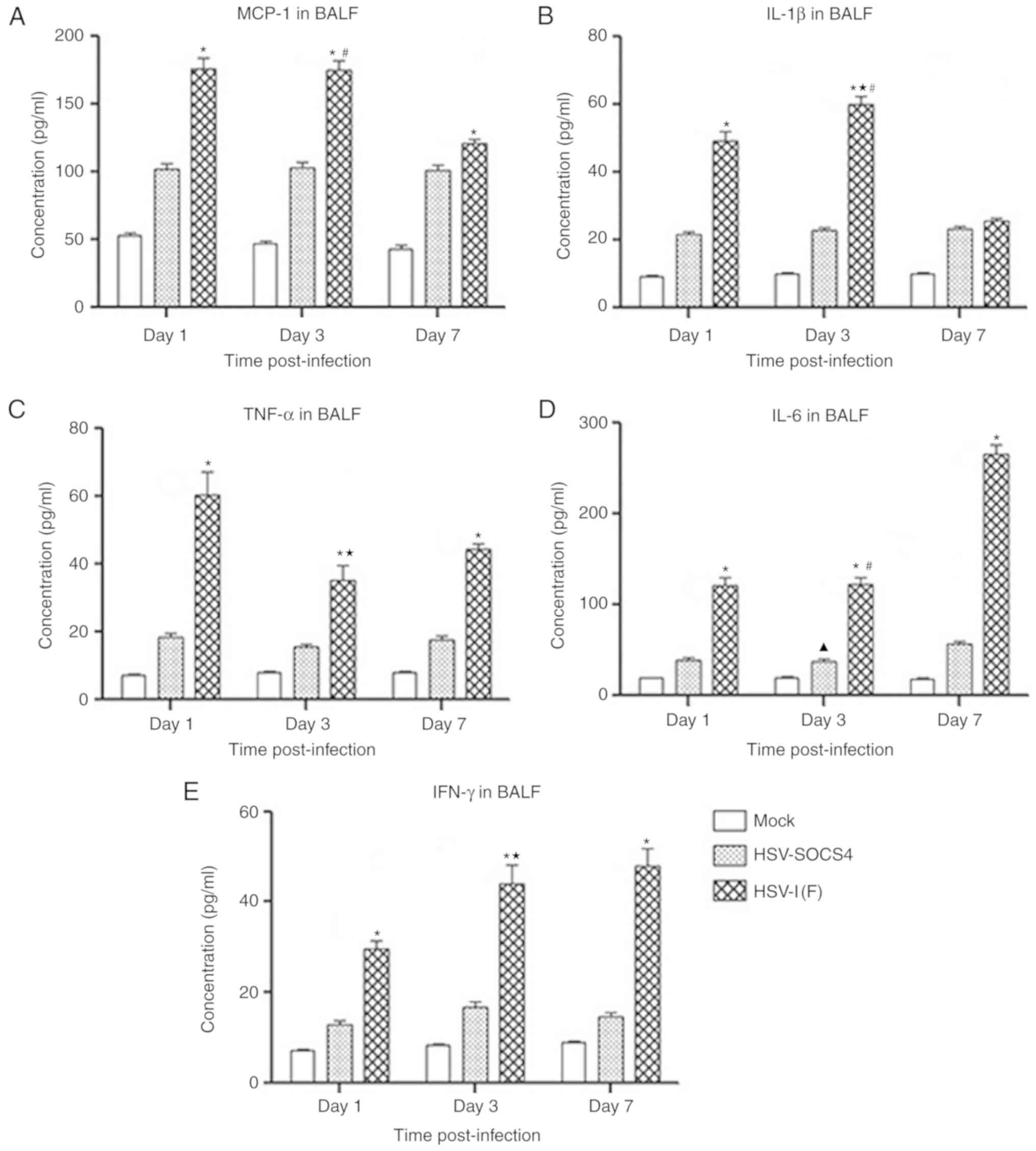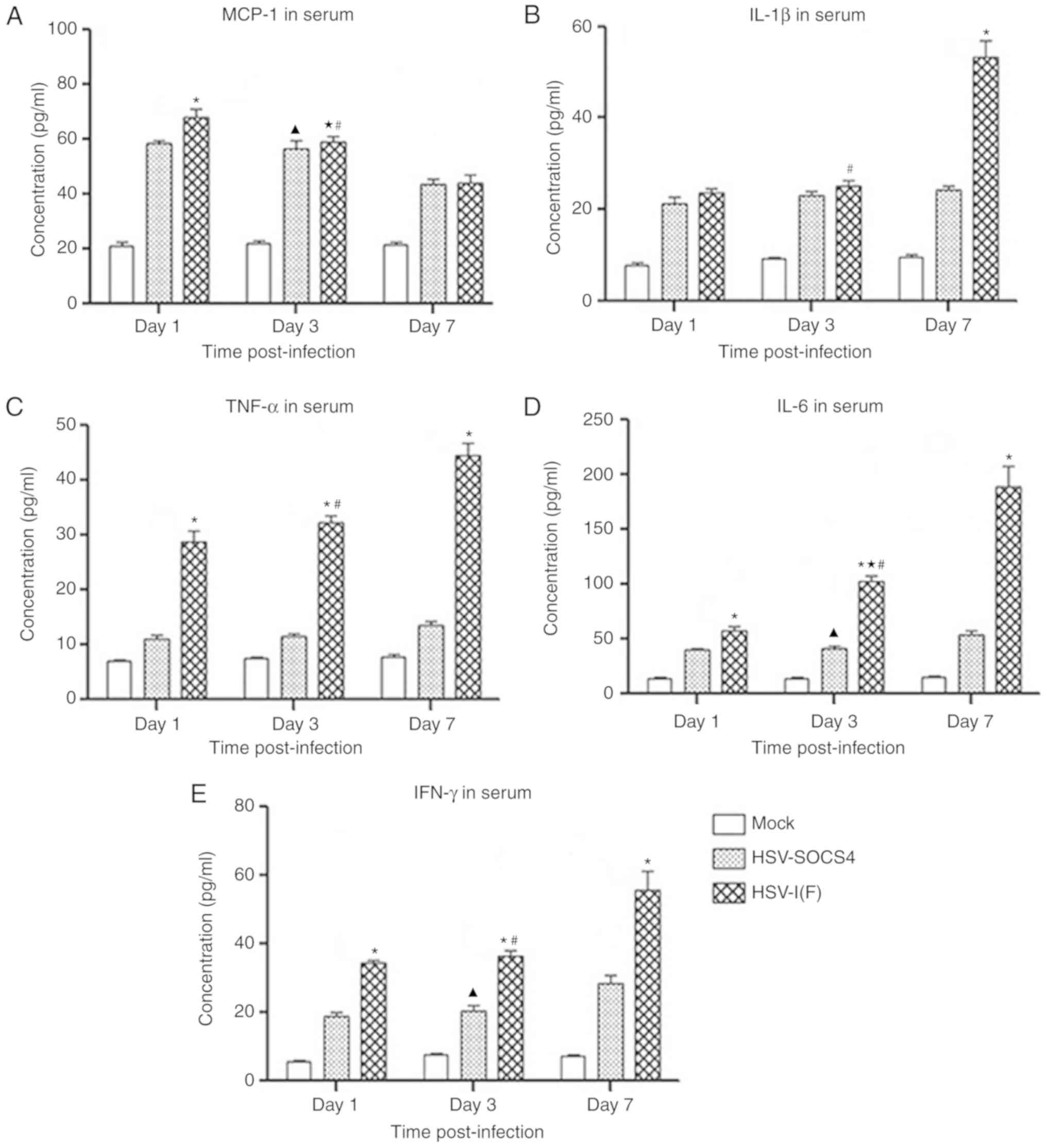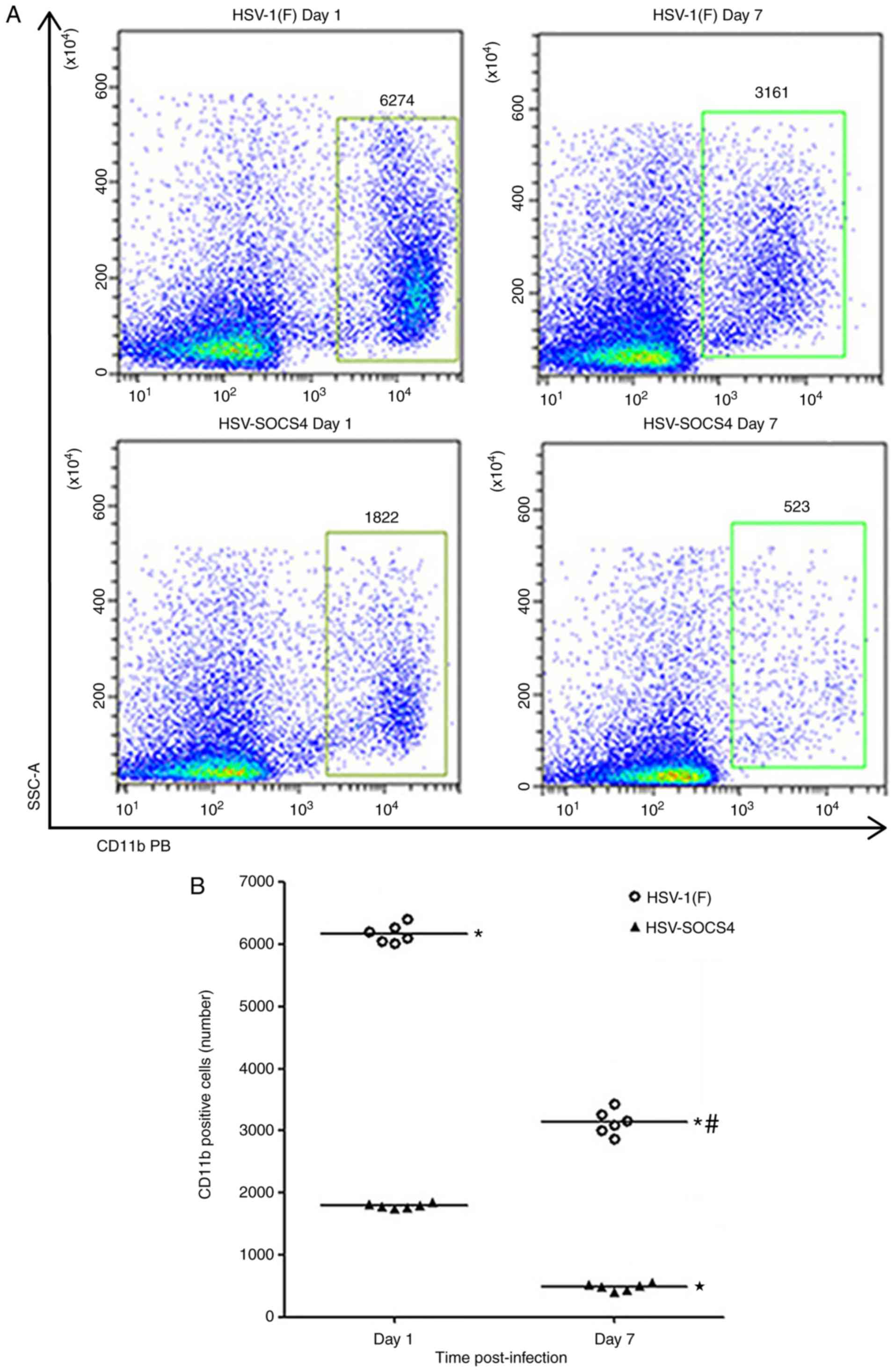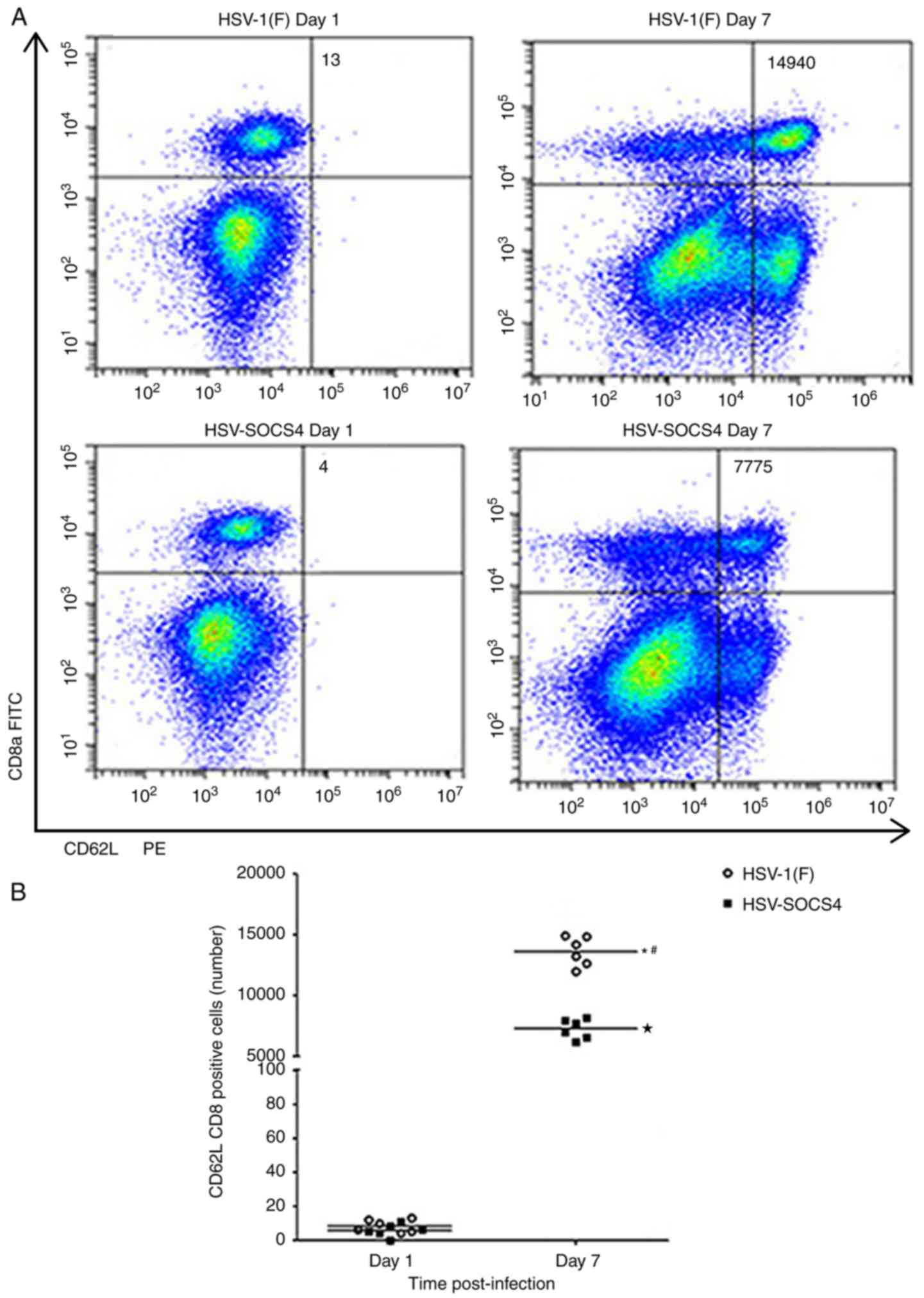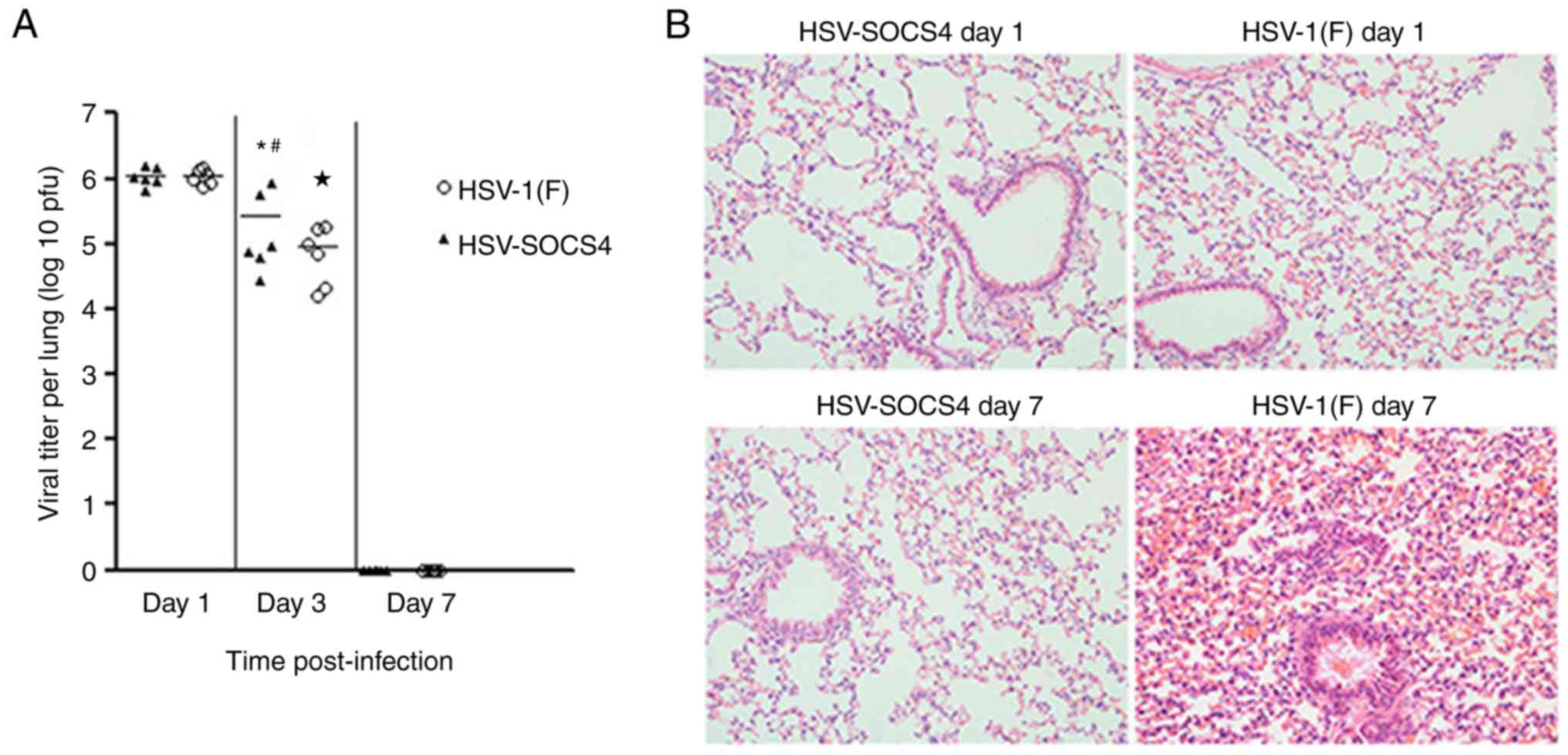|
1
|
Russell SJ, Peng KW and Bell JC: Oncolytic
virotherapy. Nat Biotechnol. 30:658–670. 2012. View Article : Google Scholar : PubMed/NCBI
|
|
2
|
Jhawar SR, Thandoni A, Bommareddy PK,
Hassan S, Kohlhapp FJ, Goyal S, Schenkel JM, Silk AW and Zloza A:
Oncolytic viruses-natural and genetically engineered cancer
immunotherapies. Front Oncol. 7:2022017. View Article : Google Scholar : PubMed/NCBI
|
|
3
|
Maroun J, Muñoz-Alía M, Ammayappan A,
Schulze A, Peng KW and Russell S: Designing and building oncolytic
viruses. Future Virol. 12:193–213. 2017. View Article : Google Scholar : PubMed/NCBI
|
|
4
|
Lin CZ, Xiang GL, Zhu XH, Xiu LL, Sun JX
and Zhang XY: Advances in the mechanisms of action of
cancer-targeting oncolytic viruses. Oncol Lett. 15:4053–4060.
2018.PubMed/NCBI
|
|
5
|
Kaufman HL, Kohlhapp FJ and Zloza A:
Oncolytic viruses: A new class of immunotherapy drugs. Nat Rev Drug
Discov. 14:642–662. 2015. View
Article : Google Scholar : PubMed/NCBI
|
|
6
|
Loskog A: Immunostimulatory gene therapy
using oncolytic viruses as vehicles. Viruses. 7:5780–5791. 2015.
View Article : Google Scholar : PubMed/NCBI
|
|
7
|
Peters C and Rabkin SD: Designing herpes
viruses as oncolytics. Mol Ther Oncolytics. 2(pii): 150102015.
View Article : Google Scholar : PubMed/NCBI
|
|
8
|
Saha D, Wakimoto H and Rabkin SD:
Oncolytic herpes simplex virus interactions with the host immune
system. Curr Opin Virol. 21:26–34. 2016. View Article : Google Scholar : PubMed/NCBI
|
|
9
|
Chaurasiya S, Chen NG and Fong Y:
Oncolytic viruses and immunity. Curr Opin Immunol. 51:83–90. 2018.
View Article : Google Scholar : PubMed/NCBI
|
|
10
|
Tisoncik JR, Korth MJ, Simmons CP, Farrar
J, Martin TR and Katze MG: Into the eye of the cytokine storm.
Microbiol Mol Biol Rev. 76:16–32. 2012. View Article : Google Scholar : PubMed/NCBI
|
|
11
|
Chousterman BG, Swirski FK and Weber GF:
Cytokine storm and sepsis disease pathogenesis. Semin Immunopathol.
39:517–528. 2017. View Article : Google Scholar : PubMed/NCBI
|
|
12
|
Alexander WS: Suppressors of cytokine
signalling (SOCS) in the immune system. Nat Rev Immunol. 2:410–416.
2002. View
Article : Google Scholar : PubMed/NCBI
|
|
13
|
Kedzierski L, Linossi EM, Kolesnik TB, Day
EB, Bird NL, Kile BT, Belz GT, Metcalf D, Nicola NA, Kedzierska K,
et al: Suppressor of cytokine signaling 4 (SOCS4) protects against
severe cytokine storm and enhances viral clearance during influenza
infection. PLoS Pathog. 10:e10041342014. View Article : Google Scholar : PubMed/NCBI
|
|
14
|
Liu Y, Qu L, Liu Y, Roizman B and Zhou GG:
PUM1 is a biphasic negative regulator of innate immunity genes by
suppressing LGP2. Proc Natl Acad Sci USA. 114:E6902–E6911. 2017.
View Article : Google Scholar : PubMed/NCBI
|
|
15
|
Adler H, Beland JL, Del-Pan NC, Kobzik L,
Brewer JP, Martin TR and Rimm IJ: Suppression of herpes simplex
virus type 1 (HSV-1)-induced pneumonia in mice by inhibition of
inducible nitric oxide synthase (iNOS, NOS2). J Exp Med.
185:1533–1540. 1997. View Article : Google Scholar : PubMed/NCBI
|
|
16
|
Liau NPD, Laktyushin A, Lucet IS, Murphy
JM, Yao S, Whitlock E, Callaghan K, Nicola NA, Kershaw NJ and Babon
JJ: The molecular basis of JAK/STAT inhibition by SOCS1. Nat
Commun. 9:15582018. View Article : Google Scholar : PubMed/NCBI
|
|
17
|
Mahony R, Ahmed S, Diskin C and Stevenson
NJ: SOCS3 revisited: A broad regulator of disease, now ready for
therapeutic use? Cell Mol Life Sci. 73:3323–3336. 2016. View Article : Google Scholar : PubMed/NCBI
|
|
18
|
Linossi EM, Babon JJ, Hilton DJ and
Nicholson SE: Suppression of cytokine signaling: The SOCS
perspective. Cytokine Growth Factor Rev. 24:241–248. 2013.
View Article : Google Scholar : PubMed/NCBI
|
|
19
|
Trengove MC and Ward AC: SOCS proteins in
development and disease. Am J Clin Exp Immunol. 2:1–29.
2013.PubMed/NCBI
|
|
20
|
Wang X, Crowe PJ, Goldstein D and Yang JL:
STAT3 inhibition, a novel approach to enhancing targeted therapy in
human cancers (Review). Int J Oncol. 41:1181–1191. 2012. View Article : Google Scholar : PubMed/NCBI
|
|
21
|
Tate MD, Ong JD, Dowling JK, McAuley JL,
Robertson AB, Latz E, Drummond GR, Cooper MA, Hertzog PJ and
Mansell A: Reassessing the role of the NLRP3 inflammasome during
pathogenic influenza A virus infection via temporal inhibition. Sci
Rep. 6:279122016. View Article : Google Scholar : PubMed/NCBI
|
|
22
|
Kaiser L, Fritz RS, Straus SE, Gubareva L
and Hayden FG: Symptom pathogenesis during acute influenza:
Interleukin-6 and other cytokine responses. J Med Virol.
64:262–268. 2001. View
Article : Google Scholar : PubMed/NCBI
|
|
23
|
Murphy EA, Davis JM, Brown AS, Carmichael
MD, Ghaffar A and Mayer EP: Effect of IL-6 deficiency on
susceptibility to HSV-1 respiratory infection and intrinsic
macrophage antiviral resistance. J Interferon Cytokine Res.
28:589–595. 2008. View Article : Google Scholar : PubMed/NCBI
|
|
24
|
Tengku-Muhammad TS, Hughes TR, Ranki H,
Cryer A and Ramji DP: Differential regulation of macrophage
CCAAT-enhancer binding protein isoforms by lipopolysaccharide and
cytokines. Cytokine. 12:1430–1436. 2000. View Article : Google Scholar : PubMed/NCBI
|
|
25
|
Hunter CA and Jones SA: IL-6 as a keystone
cytokine in health and disease. Nat Immunol. 16:448–457. 2015.
View Article : Google Scholar : PubMed/NCBI
|
|
26
|
Peiris JS, Cheung CY, Leung CY and
Nicholls JM: Innate immune responses to influenza A H5N1: Friend or
foe? Trends Immunol. 30:574–584. 2009. View Article : Google Scholar : PubMed/NCBI
|
|
27
|
Perrone LA, Szretter KJ, Katz JM, Mizgerd
JP and Tumpey TM: Mice lacking both TNF and IL-1 receptors exhibit
reduced lung inflammation and delay in onset of death following
infection with a highly virulent H5N1 virus. J Infect Dis.
202:1161–1170. 2010. View
Article : Google Scholar : PubMed/NCBI
|
|
28
|
Fujii S, Akaike T and Maeda H: Role of
nitric oxide in pathogenesis of herpes simplex virus encephalitis
in rats. Virology. 256:203–212. 1999. View Article : Google Scholar : PubMed/NCBI
|
|
29
|
Hussell T, Pennycook A and Openshaw PJ:
Inhibition of tumor necrosis factor reduces the severity of
virus-specific lung immunopathology. Eur J Immunol. 31:2566–2573.
2001. View Article : Google Scholar : PubMed/NCBI
|
|
30
|
Deshmane SL, Kremlev S, Amini S and Sawaya
BE: Monocyte chemoattractant protein-1 (MCP-1): An overview. J
Interferon Cytokine Res. 29:313–326. 2009. View Article : Google Scholar : PubMed/NCBI
|
|
31
|
Rose CJ, Sung SS and Fu SM: Significant
involvement of CCL2 (MCP-1) in inflammatory disorders of the lung.
Microcirculation. 10:273–288. 2003. View Article : Google Scholar : PubMed/NCBI
|
|
32
|
Billiau A and Matthys P: Interferon-gamma:
A historical perspective. Cytokine Growth Factor Rev. 20:97–113.
2009. View Article : Google Scholar : PubMed/NCBI
|
|
33
|
Reading PC, Whitney PG, Barr DP, Smyth MJ
and Brooks AG: NK cells contribute to the early clearance of HSV-1
from the lung but cannot control replication in the central nervous
system following intranasal infection. Eur J Immunol. 36:897–905.
2006. View Article : Google Scholar : PubMed/NCBI
|
|
34
|
Ramana CV, DeBerge MP, Kumar A, Alia CS,
Durbin JE and Enelow RI: Inflammatory impact of IFN-γ in
CD8+ T cell-mediated lung injury is mediated by both
Stat1-dependent and -independent pathways. Am J Physiol Lung Cell
Mol Physiol. 308:L650–L657. 2015. View Article : Google Scholar : PubMed/NCBI
|
|
35
|
Guo XJ and Thomas PG: New fronts emerge in
the influenza cytokine storm. Semin Immunopathol. 39:541–550. 2017.
View Article : Google Scholar : PubMed/NCBI
|
|
36
|
Holt PG, Strickland DH, Wikstrom ME and
Jahnsen FL: Regulation of immunological homeostasis in the
respiratory tract. Nat Rev Immunol. 8:142–152. 2008. View Article : Google Scholar : PubMed/NCBI
|
|
37
|
Rainer TH: L-selectin in health and
disease. Resuscitation. 52:127–141. 2002. View Article : Google Scholar : PubMed/NCBI
|
|
38
|
Liu Q, Zhou YH and Yang ZQ: The cytokine
storm of severe influenza and development of immunomodulatory
therapy. Cell Mol Immunol. 13:3–10. 2016. View Article : Google Scholar : PubMed/NCBI
|















